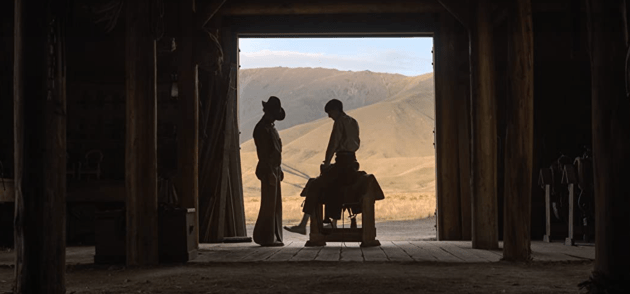
The uneasiness subtly evolves from the first few minutes. We don’t know where it’s headed, but we await.
Jonny Greenwood’s score consistently evokes the pervasive uneasiness, which seems to be centered on the brothers Phil and George Burbank.
Cumberbatch’s slow burning angst oozes across anyone in proximity, but we are unaware of the cause.
The film’s pace is slow and deliberate. Jane Campion’s steady directorial hand is in firm control. She lets the story unfold slowly, and the viewer edgily awaits the resolution of the story’s arc. Campion’s script is based on Thomas Savage’s somewhat forgotten novel.
The film’s production values are magnificent, with an accuracy that is appealing. One expects wide magnificent vistas in a cowboy film, and regardless of the relatively recent 1925 setting in Montana, cinematographer Ari Wegner delivers. Leveraging the long shadows of early morning and late afternoon, the lighting is consistently wonderful.
Greenwood’s score blends ambitious instrumentation (French horns in a vacant Oxford cathedral) to amazing effect.
But the supportive elements of score and cinematography would be of little help if the performances are lacking, and here nothing is left on the table.


The Burbank brothers are a study in contrasts. Phil (Cumberbatch) is moody, mercurial, earthy, crass and magnetic. George (Jesse Plemons) is calm, cool and collected, as opposed to the cruel character he famously played in Breaking Bad. Plemons’ real life partner Kirsten Dunst becomes his wife Rose, triggering Phil to amplify his angst. The son of Rose is Phil’s initial target, the gangly Kodi Smit-McPhee ably portrays Peter as the masculine opposite of manly Phil and the cow hands Phil supervises.
Suffice to say, the four main characters circle toward some sort of confrontation and it is to the credit of Campion that we remain uneasy about where the action will lead.
This is a film that will resonate long after the end credits roll.






Recent Comments